She pulled out her white board. In my experience, breakthroughs come when a therapist pulls out a white board.
Moments before, I’d been unloading my feelings on her. I didn’t expect anything to change; I just knew I needed to get the weight off my chest for a while.
“I love my kids,” I said. “But I can barely handle all of my feelings, much less theirs!”
Our oldest, in particular, had recently started sharing only his negative thoughts with me. He was nine at the time, so most of them were trivial, but to me, they were adding up.
Mom, my ears hurt when I swim… Mom, I don’t like my teacher… Mom, the yogurt in my school lunch was warm by lunchtime…
He’s almost thirteen now, and we’re still plugging away along the same lines—expect his complaints and wants and needs feel a bit… heavier than they did then. (Not to mention all of the negativity I’m fielding from my other kids!)
Think about how much negativity you take in on a daily basis. And not just from your kids but from, let’s say, a pessimistic co-worker, a critical parent figure in your life, or a Facebook feed that’s filled with polarized views.
It’s 2021, and we’ve only recently made it through a presidential election and a global pandemic. The negativity around us might have reached an all-time high!
But back to my therapist’s office…
My therapist adjusted the white board on her lap and said it represented a continuum. On one side she drew a circle using a dashed line, and on the other side, she drew a circle using a solid line.
Then she drew arrows pointing toward each circle, but only one of the circles (the one made out of a dashed line) was penetrated by the arrows. The arrows pointing at the other circle (the solid one) couldn’t get through.
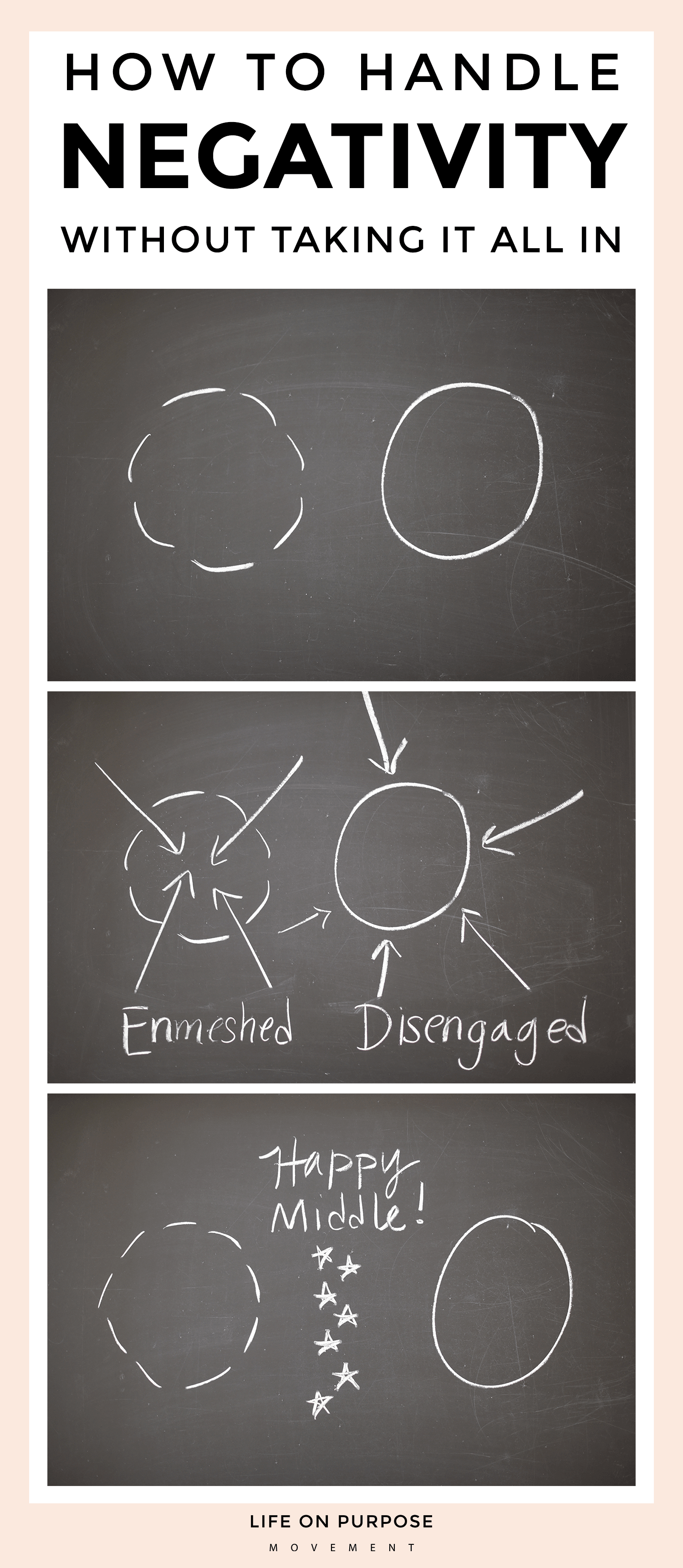
“You,” she said, “are the dashed circle. We call that ‘enmeshed.’ Everything gets through. You take it alllllll in.”
She added that we also don’t want to be “disengaged,” the solid circle on the opposite side of the white board. That’s too far on the other extreme. Nothing gets in, and it’s an isolating way to live, both for ourselves and the people around us.
So where do we want to be? You guessed it—the happy middle!
She drew a dozen stars right in between the two circles on the board.
—
If I had to guess, I’d say most women err on the side of being overly permeable—of being the circle made of a dashed line.
We know how our children feel about each of their friends, how our mom friends feel about each other, how our colleagues feel about their jobs, how our spouses like their toast!
And sometimes what we know—all that information that we’re the keepers of—becomes how we feel.
What we’re looking for, though, is a balance between permeable (or enmeshed, as my therapist called it) and impenetrable (or disengaged).
So if you need to hear this today, please know—
Not everyone’s opinion needs to rest on your shoulders.
Not every like or dislike needs to be filed away in your memory.
Not every complaint that escapes your child’s lips needs to be fixed by you.
It’s okay to just hear… and release.
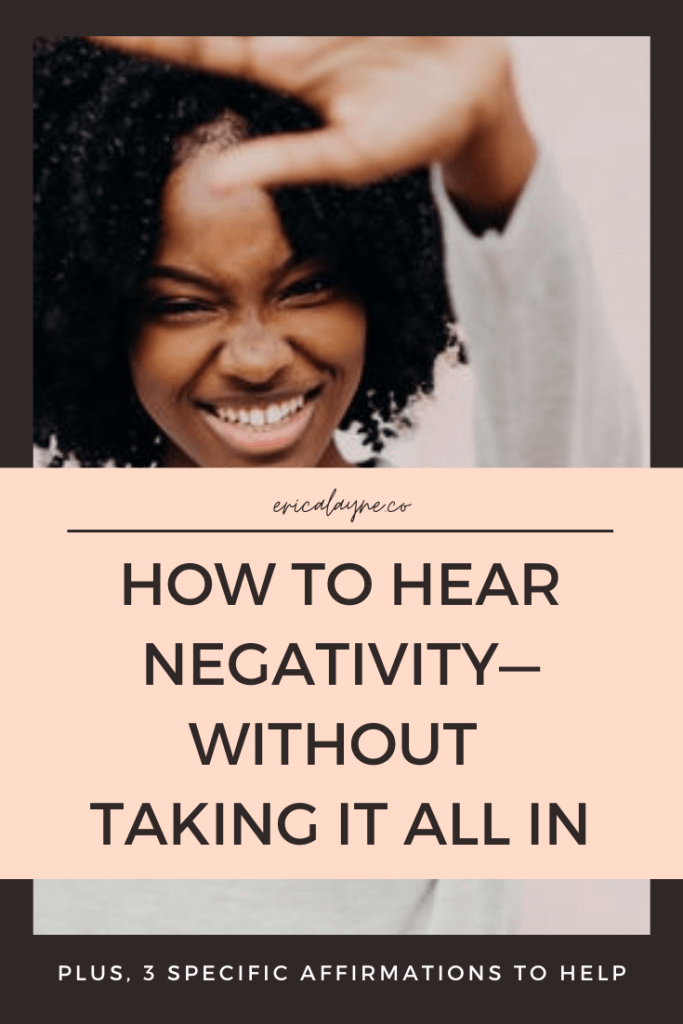
3 Affirmations to Help You Hold Negativity at Bay
1. You are the eye of the storm.
You know how a hurricane can be raging, but deep within is a small circle of stillness? I try to think of myself as the eye of the storm anytime I’m facing something I don’t want to disturb my inner calm.
I am the eye of the storm. That negativity isn’t getting in right now.
2. You’re not meant to carry what isn’t yours.
This one is especially for the empaths and the highly sensitives among us: You’re not meant to carry what isn’t yours.
You can help shoulder a burden for a while; you can shore up a loved one in their time of need.
But remember that if that burden were meant to be yours, it would be.
There’s a difference between supporting and owning. Take a deep breath, and gently let go of the burdens that aren’t yours to carry.
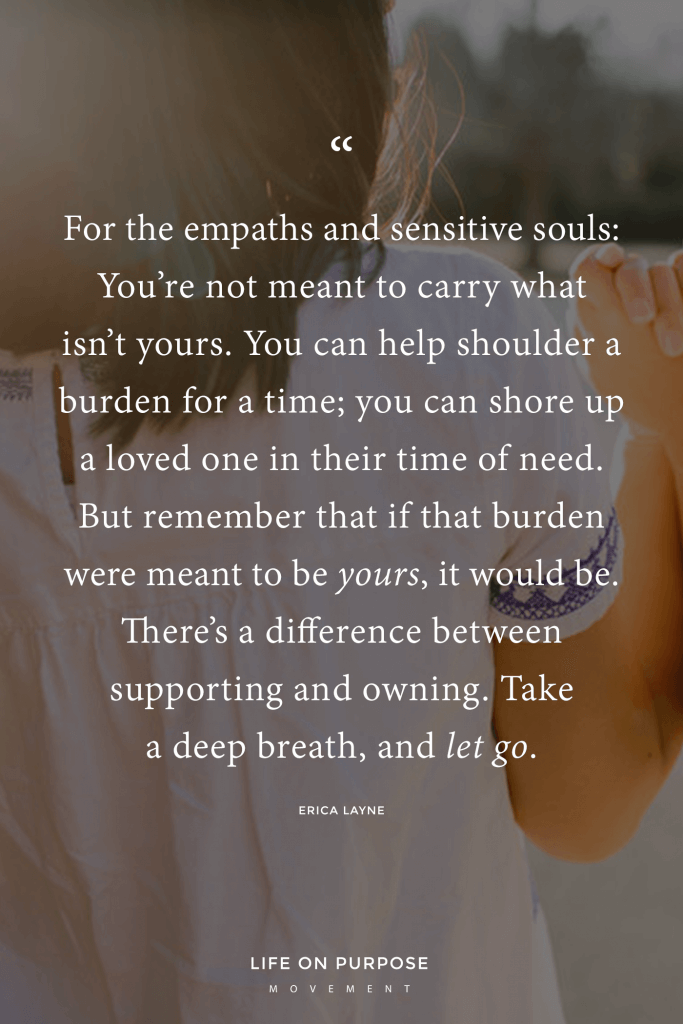
3. Most complaints are a bid for connection—not a cry for help.
When you can keep yourself from becoming enmeshed—from letting all of those negative feelings inside—you’ll be more able to recognize what’s at play under the surface.
Maybe when your son comes to you with negativity, it’s not a problem for you to solve as much as it is a need for you to simply be there with him. And maybe your daughter can live with the way her door hinges squeak or the way her brother chews at the dinner table, but she can’t thrive without you.
The same goes with the negativity we hear from co-workers, friends, spouses, parents—anyone.
Most complaints are a bid for connection—not a cry for help.
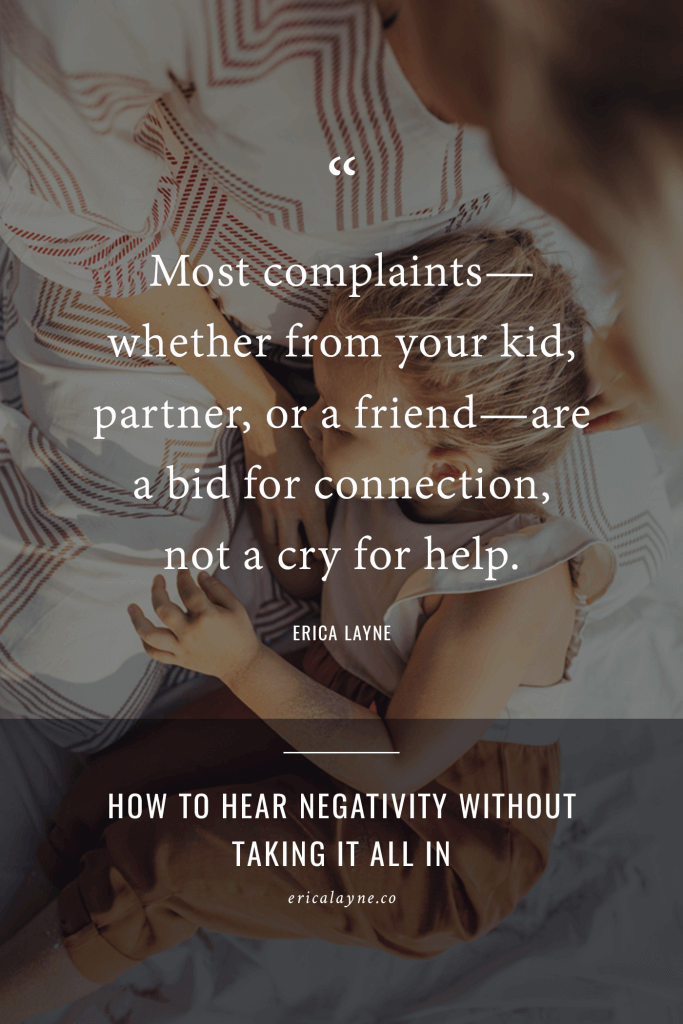
“Mom,” my son said later that night, well after I’d left my therapist’s couch. “Do we have to have to eat this for dinner??”
“Yeah, bud. This is what I made. But tell me about your favorite meal you’ve EVER had. I want to hear all about it.”
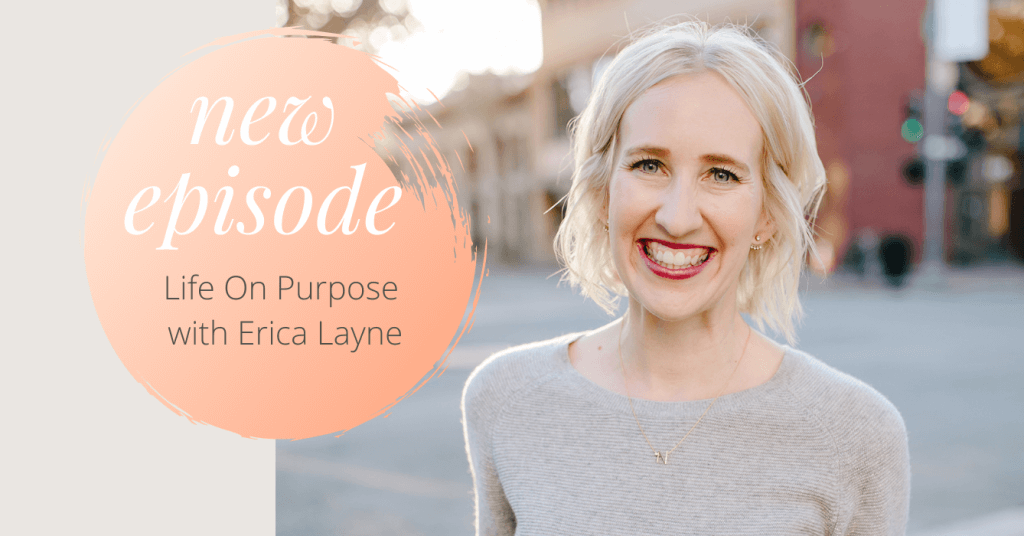
More from Episode 28 of “Life On Purpose with Erica Layne”
Here’s what else you can hear in the latest episode of the podcast!
- What Matters Most: A segment to help us take our eyes off the nonessentials and refocus on the essentials. In this episode I want to encourage you that while, yes, it’s hard running the race you’re running, you’re doing a GREAT job!
- One thing that helps me slow the pace of my life—even just for 60 seconds every morning—is The Authenticity Calendar. The Authenticity Calendar is a page-a-day calendar filled with 365 inspiring quotes and affirmations. Each card is a little dose of stillness. Of presence. Even in the midst of your busy life. The calendar can be started at any point in the year and reused year after year. Check out how beautiful it is, and get your copy!
Listen to the full podcast episode in your favorite podcast app or in the audio player below!
Apple Podcasts | Google Podcasts | Spotify | Overcast | Stitcher | Amazon
Show produced by Callie Wright
I hope this helps you to hear negativity without taking it all in!
xo!

P.S. I’m curious—Where would you say you naturally fall on the continuum? Do you let it all in like I do?




Hi Erica, I feel like we’re on the same page even though my kids are older. To be perceptive enough to look past the comment or behavior and give loving connection – such a gift for you both. Thank you for reminding me to put attention on what’s important and find my happy middle instead of absorbing the negative.
Thanks, Christine! YES, for some reason this simple visual has really helped me be more thoughtful about absorbing the negative. Hope you have a great day, girl!
This is a great perspective! As a highly sensitive person I REALLY feel everything that comes at me. This really helps. Thanks for sharing!
YES, me too, Amy! Hopefully this visual will be especially helpful for the highly sensitives. 🙂
This is really helpful, I’m going to be mulling this over and working to apply it to my relationships with my little boys … and my husband! That said … I am currently in conflict with my mom, who is angry/not speaking to me after I called her out on her constant negativity a couple of weeks ago. In her case, it’s not just complaining about little life stuff (although there is plenty of that), it’s constantly saying horrible things about family members and people I love. The tendency in the family for years is just to sit by silently while she dominates every conversation with her toxicity … a couple of weeks ago it was happening at my grandma’s funeral with zero concern for any of the family members who were grieving … in fact, she kept up a steady stream of hateful comments about those family members, as usual. I was finally fed up and emotional enough to say something. The idea of not having to absorb her negativity makes sense but … does there come a point when that isn’t enough? When actual boundaries should be set? Changing the subject/redirecting doesn’t work with her the way it’s talked about above (she either ignores the attempt, or pouts when she can’t control the conversation, or gets outright angry and starts making random accusations against the person who confronts her, then completely withdraws. For a while.).
Whew. I’m aware that this issue and all my own baggage with my mom cannot be resolved or addressed deeply enough in a blog post comment … but I loved the post and basically am wondering how it can be applied in a rather extreme situation.
I like this article but it really doesn’t tell you how to apply this practically.
I was thinking of doing a follow-up with more examples—Sounds like that might be useful!
Thank you for this. Recently my nearly 7 yo daughter is complaining about everything and its just overwhelming in a time when my husband`s job isn’t going well and my father has been diagnosed with terminal cancer. (add my special needs son on top and its just too much)…I want to run away and leave this all behind but I know my family needs me and I do need to be less permeable!! So much easier said than done……….
Please do give more examples – how to live in the middle.
More examples would be great! The one at the very end would never work on my oldest, for instance. She would straight up refuse to answer the positive question, or turn it even more negative by saying she’s never had a great meal or something. She is the most stubbornly negative person I know. Any attempt to derail her complaints and get her to focus on the positive is unsuccessful.
our counselor suggests that any attempt to sympathise with our daughter – or as in the case above to so obviously redirect her – is taken as a denigration of her feelings and contributes to resentment and estrangement. She needs to feel them (so.many.feels! she’s 8 but you’d think she was 16!), the trouble we have is in coaching her to let them just be yet keep them from harming anyone. Unfortunately this often ends up sounding like: “I’m sorry to hear that you are unhappy, but hurting others with your words or body is not allowed and will not help the hurting”. Which turns her inability to cope right back on her.
I have to focus on the idea that her feelings are powerful, rather than negative, in order to maintain some perspective and composure. Sometimes her emotions are so powerful that she can’t contain them in her tiny body. Perhaps she experiences anything other than total enmeshing as disengagement (I fail to absorb her overflow, fail to save her from this tsunami inside her) and a rejection of her Self.
Or not. All I know is that she slammed her door so often that I took it off the hinges.
You sound like a very invested mother, Lauren, and your daughter is lucky to have you! And YES, I totally agree with your approach—letting her experience those negative feelings and learn to recognize them. Carry on, mama!
As if starting over child bearing at 40 wasn’t hard enough for me. I realized I was out of touch with alot of things. U have taught me to exhale again. The boys are 6&7. More rambunctious as ever. THANK YOU.
#1Dayatatime
#BeatheAgain
#PositiveParenting
What a great perspective on how to handle negativity! Thank you so much for sharing that with us!
Erica,
Thank you. I’ve had to switch between continuums off and on, and also try to maintain balance in the middle with various students in my classes over the years. I notice how many children rely on adults for their wants, needs, validations, connections and more, especially with the virtual and digital age upon us with less backyard time.
With my own daughters, I feel they need more “grounding” time. In other words, more time in nature, or alone with a book, board game or needle and thread. Why do they always feel the need to be busy or accomplish something? When they complain to me they are bored, I always reply, “Good. It’s good to be bored.” And I leave it at that while I watch and observe their choice of creativity or lack thereof in the next hour.
I have found it “too much” at times in the classroom when the high maintenance kiddos get all the attention all year and I do feel bad that I rarely got to know the quiet and reserved kids. Makes one wonder if they needed me or not. If I should have done more. Or differently.
-Anna Kamin
Turn a complaint into a connection. That is fantastic, thanks so much xx